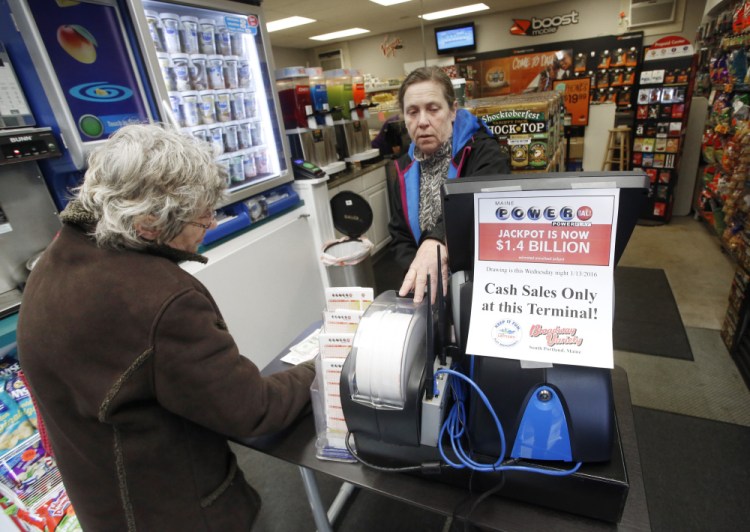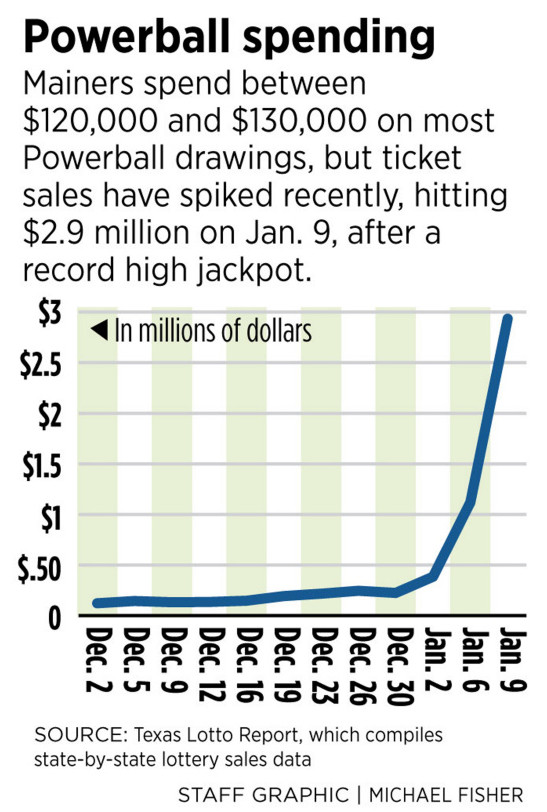Before each twice-weekly Powerball drawing, Mainers spend an average of $120,000 to $130,000 on Powerball tickets.
In advance of Saturday’s $947 million jackpot drawing, that number skyrocketed to $2.9 million.
That means the state’s general fund, which generally receives about 25 percent of lottery sales, got a boost of about $725,000, compared with the $30,000 or so it typically receives in weeks when interest in playing Powerball isn’t high.
With the jackpot estimated to hit an unprecedented $1.5 billion before Wednesday’s drawing, the number of Mainers buying the $2 tickets is likely to go even higher.
“We’re in uncharted waters,” said Tim Poulin, deputy director of the Bureau of Alcoholic Beverages and Lottery Operations. “The only way we get to these numbers is when the draw is this big. You get all these people who would never otherwise play.”
The vast majority of those who play Powerball will not see a dime of that money. So where does it all go?
Most of it is disbursed to the winners, but all states that participate in the lottery keep portions of the sales. While some states earmark lottery revenue for specific purposes, it goes to one place in Maine: the state’s general fund.
Where it goes from there is impossible to track.
“It’s the general fund, so it’s education and social services, which make up the biggest share of state spending,” Poulin said.
There is no defined formula in state statute for where the money must go, Poulin said. The only requirement is that at least 45 percent is returned to players through payouts and that retailers get a portion of ticket sales, about 5 percent.
Although roughly 64 percent of sales revenue went to payouts last year, the Maine State Lottery usually returns about 50 percent to players, Poulin said. Twenty 20 percent goes to cover operational expenses, vendor fees and marketing or promotions, and the remaining amount, roughly 25 percent, goes to the general fund.
Even though states are seeing a spike in ticket sales spurred by the Powerball jackpot, the amount of money that Maine’s government sees in total net revenue from the lottery is pretty small – about $50 million annually, only 1.5 percent of all state revenue.
About 7 percent of the $50 million comes from Powerball, according to the lottery bureau, although that could change if the current jackpot keeps growing and Mainers keep buying tickets.
In mid-December, when the Powerball jackpot eclipsed $200 million, Mainers began spending more than the usual $120,000 to $130,000 on each drawing.
Before the Dec. 23 drawing, sales hit $217,046. On Jan. 2, when the Powerball jackpot was $334 million, sales jumped to $384,800. Before Saturday’s $947 million drawing, Maine sold $2.9 million in tickets.
A state-by-state sales breakdown before Wednesday’s drawing was not available Tuesday, since tickets were still being sold, but Poulin said he wouldn’t be surprised if sales in Maine topped $3 million. If someone wins this week or next, he expects Powerball sales in Maine to return to normal.
Looking ahead, it’s hard to predict whether Maine will see a noticeable increase in lottery revenue by the end of the fiscal year June 30.
If a Maine resident wins the Powerball, the state will get a big windfall in taxes. The 5 percent state tax on the $930 million lump-sum payout would be $46.5 million, Poulin said.
Don’t get too excited, though, because the odds of winning are pretty low: 1 in 292,201,338.
Amid hysteria over Powerball, Maine State Lottery officials sent out a news release Tuesday encouraging players to temper any expectations.
“We understand the excitement and want everyone to have fun, but can’t stress enough the importance of playing responsibly,” said Michael Boardman, director of the Lottery Division of the Maine Bureau of Alcoholic Beverages & Lottery Operations.
Even if no one wins the jackpot Wednesday, it’s likely someone soon will because there is a finite number of number combinations. According to The Boston Globe on Tuesday, roughly 80 percent of all combinations will have been purchased by Wednesday’s drawing, given the number of people playing.
No Mainer has ever won the top Powerball prize, although some have won $2 million, most recently a Bath man in May 2014.
In June 2013, Florida resident and former Mainer Gloria MacKensie won the largest single Powerball jackpot in history, roughly $590 million. She took the lump-sum payout, which was about $280 million.
Although Powerball is the biggest draw game managed by the Maine lottery, scratch tickets still make up an overwhelming percentage of revenue, Poulin said.
In fact, Powerball sales in Maine have decreased by 42 percent over the past decade, from $32.3 million in the 2006 fiscal year to $18.8 million last year.
The Maine State Lottery was established in 1974 in a statewide referendum.
There have been legislative attempts in Maine to earmark lottery revenue for specific purposes, but those measures have failed.
By comparison, Maine exercises more control over casino revenue generated at Hollywood Casino in Bangor and Oxford Casino in Oxford.
Each casino was approved through statewide referendums that clearly spelled out where the net revenue would go. Some goes to education, some to the host community, some to fund enforcement and addiction resources.
The increased interest in Powerball in Maine comes at a time when lawmakers are considering a review of Maine Lottery operations to determine whether the poor are being targeted by marketing efforts.
The Government Oversight Committee voted unanimously last week to investigate state spending of $8 million per year on marketing its lottery operations.
The review was initiated after an investigation by the Maine Center for Public Interest Reporting that was published in the Portland Press Herald in October.
The investigation found residents of the state’s poorest towns spend up to 200 times more per person on the lottery than residents in wealthier areas. It also found that the state-run lottery has more than tripled its advertising budget since 2003 and has never been subjected to a study of the lottery’s impact on the lives and finances of the poor and unemployed, who spend the most on tickets.
Send questions/comments to the editors.





Success. Please wait for the page to reload. If the page does not reload within 5 seconds, please refresh the page.
Enter your email and password to access comments.
Hi, to comment on stories you must . This profile is in addition to your subscription and website login.
Already have a commenting profile? .
Invalid username/password.
Please check your email to confirm and complete your registration.
Only subscribers are eligible to post comments. Please subscribe or login first for digital access. Here’s why.
Use the form below to reset your password. When you've submitted your account email, we will send an email with a reset code.